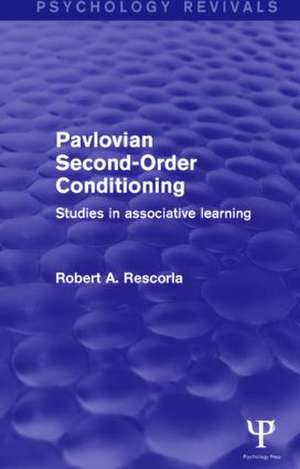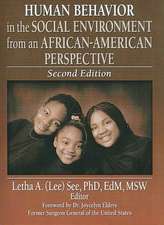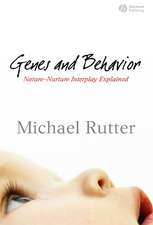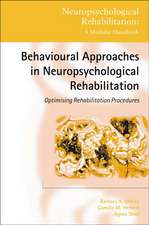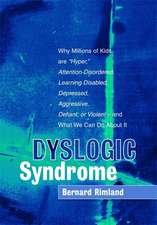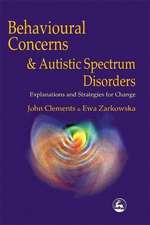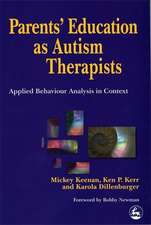Pavlovian Second-Order Conditioning (Psychology Revivals): Studies in Associative Learning: Psychology Revivals
Autor Robert Rescorlaen Limba Engleză Paperback – 17 sep 2015
The usefulness of this new paradigm is documented with the results of experiments that had grown out of the author’s programmatic work at the time. Completely new results were published for the first time, in an attempt to demonstrate the power of this particular learning procedure in elucidating fundamental questions about the nature of learning.
| Toate formatele și edițiile | Preț | Express |
|---|---|---|
| Paperback (1) | 476.95 lei 6-8 săpt. | |
| Taylor & Francis – 17 sep 2015 | 476.95 lei 6-8 săpt. | |
| Hardback (1) | 782.44 lei 6-8 săpt. | |
| Taylor & Francis – 19 mar 2014 | 782.44 lei 6-8 săpt. |
Din seria Psychology Revivals
- 9%
 Preț: 800.46 lei
Preț: 800.46 lei - 9%
 Preț: 940.09 lei
Preț: 940.09 lei -
 Preț: 326.49 lei
Preț: 326.49 lei - 18%
 Preț: 661.73 lei
Preț: 661.73 lei -
 Preț: 246.17 lei
Preț: 246.17 lei - 9%
 Preț: 903.58 lei
Preț: 903.58 lei -
 Preț: 258.67 lei
Preț: 258.67 lei - 5%
 Preț: 218.55 lei
Preț: 218.55 lei - 9%
 Preț: 1460.68 lei
Preț: 1460.68 lei -
 Preț: 258.67 lei
Preț: 258.67 lei -
 Preț: 338.40 lei
Preț: 338.40 lei - 5%
 Preț: 265.78 lei
Preț: 265.78 lei -
 Preț: 341.57 lei
Preț: 341.57 lei -
 Preț: 401.26 lei
Preț: 401.26 lei - 28%
 Preț: 992.63 lei
Preț: 992.63 lei - 44%
 Preț: 724.77 lei
Preț: 724.77 lei - 19%
 Preț: 290.61 lei
Preț: 290.61 lei - 28%
 Preț: 989.34 lei
Preț: 989.34 lei - 28%
 Preț: 552.60 lei
Preț: 552.60 lei - 28%
 Preț: 820.71 lei
Preț: 820.71 lei - 26%
 Preț: 846.09 lei
Preț: 846.09 lei - 18%
 Preț: 1053.33 lei
Preț: 1053.33 lei - 18%
 Preț: 1061.19 lei
Preț: 1061.19 lei - 25%
 Preț: 964.75 lei
Preț: 964.75 lei - 18%
 Preț: 1164.12 lei
Preț: 1164.12 lei - 28%
 Preț: 850.59 lei
Preț: 850.59 lei - 28%
 Preț: 847.73 lei
Preț: 847.73 lei - 29%
 Preț: 594.33 lei
Preț: 594.33 lei - 28%
 Preț: 825.21 lei
Preț: 825.21 lei - 27%
 Preț: 1049.90 lei
Preț: 1049.90 lei - 28%
 Preț: 1046.65 lei
Preț: 1046.65 lei - 21%
 Preț: 906.17 lei
Preț: 906.17 lei - 28%
 Preț: 848.15 lei
Preț: 848.15 lei - 5%
 Preț: 1423.10 lei
Preț: 1423.10 lei - 28%
 Preț: 819.48 lei
Preț: 819.48 lei - 18%
 Preț: 1055.21 lei
Preț: 1055.21 lei - 18%
 Preț: 1284.97 lei
Preț: 1284.97 lei - 26%
 Preț: 819.48 lei
Preț: 819.48 lei - 29%
 Preț: 1299.62 lei
Preț: 1299.62 lei - 27%
 Preț: 1022.07 lei
Preț: 1022.07 lei - 28%
 Preț: 847.73 lei
Preț: 847.73 lei - 25%
 Preț: 964.32 lei
Preț: 964.32 lei - 26%
 Preț: 819.90 lei
Preț: 819.90 lei - 21%
 Preț: 906.17 lei
Preț: 906.17 lei - 28%
 Preț: 849.84 lei
Preț: 849.84 lei - 5%
 Preț: 1413.77 lei
Preț: 1413.77 lei - 29%
 Preț: 622.59 lei
Preț: 622.59 lei - 20%
 Preț: 1062.55 lei
Preț: 1062.55 lei - 18%
 Preț: 1063.44 lei
Preț: 1063.44 lei - 18%
 Preț: 876.27 lei
Preț: 876.27 lei
Preț: 476.95 lei
Nou
Puncte Express: 715
Preț estimativ în valută:
91.27€ • 99.11$ • 76.67£
91.27€ • 99.11$ • 76.67£
Carte tipărită la comandă
Livrare economică 22 aprilie-06 mai
Preluare comenzi: 021 569.72.76
Specificații
ISBN-13: 9781848724440
ISBN-10: 1848724446
Pagini: 132
Dimensiuni: 138 x 216 x 11 mm
Greutate: 0.16 kg
Ediția:1
Editura: Taylor & Francis
Colecția Psychology Press
Seria Psychology Revivals
Locul publicării:Oxford, United Kingdom
ISBN-10: 1848724446
Pagini: 132
Dimensiuni: 138 x 216 x 11 mm
Greutate: 0.16 kg
Ediția:1
Editura: Taylor & Francis
Colecția Psychology Press
Seria Psychology Revivals
Locul publicării:Oxford, United Kingdom
Public țintă
Postgraduate, Professional, and UndergraduateCuprins
Preface. 1. Introduction 2. Uses in Detecting Learning 3. The Conditions Producing Associative Learning 4. The Contents of Learning. References. Author Index. Subject Index.
Descriere
Originally published in 1980, this volume explores some of the dramatic and exciting changes that had taken place in the field of conditioning in the 15 years prior to publication. The usefulness of a particular learning procedure, second-order conditioning, is explored in three aspects of the learning process.
The usefulness of this new paradigm is documented with the results of experiments that had grown out of the author’s programmatic work at the time. Completely new results were published for the first time, in an attempt to demonstrate the power of this particular learning procedure in elucidating fundamental questions about the nature of learning.
The usefulness of this new paradigm is documented with the results of experiments that had grown out of the author’s programmatic work at the time. Completely new results were published for the first time, in an attempt to demonstrate the power of this particular learning procedure in elucidating fundamental questions about the nature of learning.
